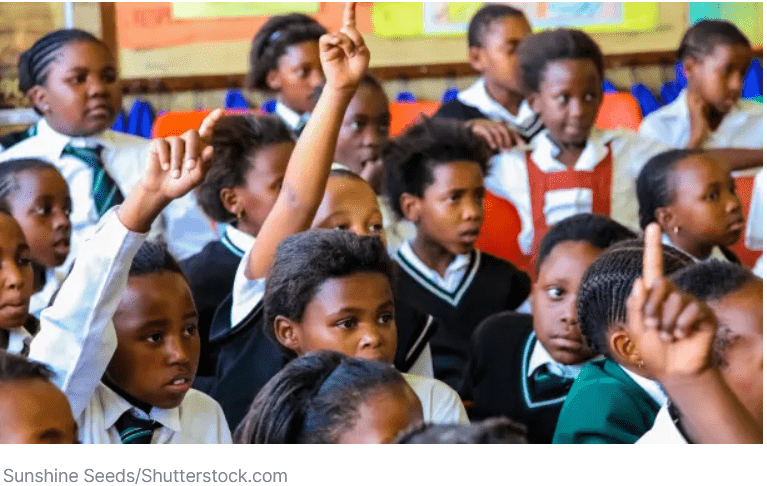The second report monitoring the Continental Education Strategy for Africa (CESA) and Sustainable Development Goal 4 (SDG 4), jointly published by UNESCO, UNICEF and the African Union, provides a comprehensive assessment of progress towards the targets set for education in Africa.
The report entitled Transforming learning and skills development in Africa, underscores the urgent need for coordinated action to reinforce education systems and equip Africans with the skills and knowledge necessary for a sustainable future.
It was launched on 7 April during the Africa Regional Forum on Sustainable Development in Kampala, Uganda.
What are the main findings of the report?
The report suggests extremely limited progress. Although 75 million more African children are enrolled in school today compared to 2015, the number of out-of-school children has increased by 13.2 million to over 100 million during the same period.
Even more alarming is the lack of improvement in the quality of education, whether measured in terms of basic infrastructure or learning outcomes. The average school student in Africa today is about as likely to have a qualified teacher and have access to basic facilities such as water and electricity as their peers from 10 years ago.
In terms of learning outcomes, the evidence available suggests that levels of learning are very low and are decreasing rather than increasing. The existing data estimate that 4 out of 5 children aged 10 in Africa cannot read and comprehend a simple text.
What are the main challenges to equitable access and retention in Africa?
The report explains the lack of significant progress by three major contextual factors: the rapid population growth across the continent, ongoing humanitarian crises and fragility, and the inadequate financing of education systems.
Rather than increasing investments in education, in line with international commitments and population growth, African countries are now generally investing less in education than they did in 2015 and 2020. The average annual finance gap for education in Africa stands at US$77 billion.
Location and level of wealth are the most significant factors driving inequitable access. Children and young people in rural and marginalized communities continue to be disproportionately affected by educational inequalities. In some countries, secondary school completion rates among rural youth are up to 20 percentage points lower than those of their urban peers.
A lack of school facilities, teacher shortages, and inadequate resources further widen the gap. For example, Africa needs to recruit at least 15 million more teachers to ensure primary and secondary education goals by 2030.
Early childhood education remains underdeveloped in many regions, and transition rates from primary to secondary school vary considerably. While completion rates at primary, lower and upper secondary are increasing, they are doing so at a very slow pace – less than one per cent a year in both Northern and sub-Saharan Africa. Meanwhile, child labour, early marriage, and insecurity contribute to high dropout rates, particularly among girls, further exacerbating the crisis.
How are African countries improving the quality of education and skills development?
Beyond access, ensuring quality education for students remains a significant hurdle. Many learners continue to struggle with foundational deficits, failing to acquire basic literacy and numeracy skills. Outdated curricula, insufficient teacher training, and a lack of relevant learning materials are hampering educational outcomes at all levels.
In response to these challenges, several African countries are reforming their curricula, introducing competency-based learning, and bolstering teacher professional development programmes. There is also an increasing focus on technical and vocational education and training (TVET), designed to equip students with practical skills aligned with labour market needs. However, sustained investment in teaching quality, modern learning resources, and stronger connections between education and employment remains essential for ensuring long-term success.
How can governance and education system management drive transformation?
Effective governance and management are vital for the transformation of education systems in Africa. Many countries on the continent face significant challenges in planning, financing, and implementing evidence-based policymaking. Insufficient investment in education, particularly in low-income nations, restricts the ability to expand access, improve infrastructure, and deliver quality learning for all.
Several nations are enhancing their education financing strategies, increasing accountability in school management, and adopting data-driven policymaking to improve system efficiency. Strengthening national education plans, increasing domestic and international funding, and fostering regional collaboration are critical steps toward sustainable education reform.
What are the key recommendations of the continental report?
The report identifies five main recommendations for education in Africa to thrive, including:
- Make better use of what already exists – the principle is to leverage the limited available resources such as physical infrastructure, low tech technology, homegrown school feeding programmes, promising pedagogies etc.
- Make better use of data and evidence – nearly all educational interventions call for more and better data and for plans and decision-making to be anchored in evidence.
- Involve local communities more – educators, parents, and local actors have crucial roles to play in ensuring that education systems more effectively consider local realities and needs.
- Enhance coordination and collaboration – high levels of coordination and collaboration are key drivers of change and success.
- Scale up promising education intervention and adapt to specific contexts – effective solutions align with local priorities, are feasible in terms of resources, and have a robust scaling strategy.
The new joint continental report is the second in a series to take stock of education in Africa. The first continental report Education in Africa: Placing equity at the heart of policy, was published in 2023 by UNESCO and the African Union.
UNESCO is leading efforts to advance education across Africa, driven by its strong commitment to ensure inclusive, equitable quality education for all. Working with African Member States, the Organization implement large-scale initiatives aimed at improving access to education, enhancing the quality of teaching, and promoting lifelong learning opportunities.
Source:https://www.unesco.org/en/articles/qa-what-you-need-know-about-state-education-africa?hub=343


